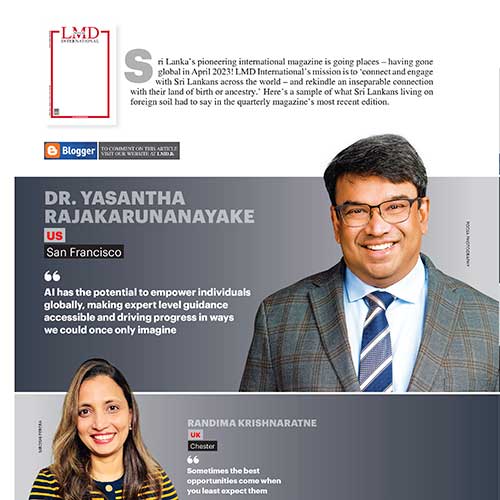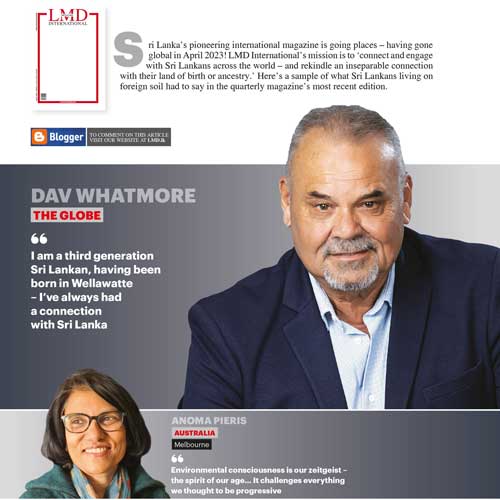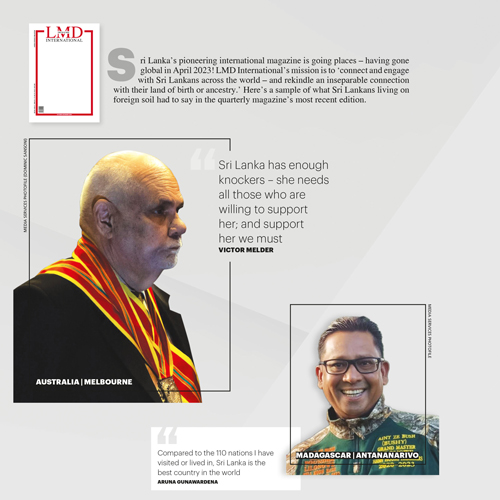SRI LANKANS OVERSEAS

REGAINING SRI LANKA
Sri Lanka is in need of refreshed governance – Christina Sitlani
Q: As far as perceptions go, do you think Sri Lanka is capable of regaining its composure in the aftermath of the COVID-19 pandemic?
A: I believe that Sri Lankans have enormous latent potential and a high level of resilience. These are assets that should be leveraged and directed towards a positive trajectory in the aftermath of the pandemic.
 The country’s recent history with its numerous challenges has proved that the people have the strength and tenacity to pick up, and continue with life time and again.
The country’s recent history with its numerous challenges has proved that the people have the strength and tenacity to pick up, and continue with life time and again.
However, the dilemma is whether these strengths are being channelled towards action for positive change and growth or used as a crutch for passive compliance. The pandemic offers a once in a lifetime opportunity to use the crisis as a springboard for newer and better policies, strategic initiatives and workflow systems.
I believe that if there is a will, the way will be found.
Q: How do you perceive Sri Lanka today?
A: It is one of the most endowed countries in the region with incredible potential to thrive, given the appropriate environment for growth. Leading the charge should be a strong government with an interest in the citizenry rather than personal greed, corruption and nepotism.
 Q: And how do Canadians view Sri Lanka?
Q: And how do Canadians view Sri Lanka?
A: They see Sri Lanka as a tourist destination with beautiful beaches, friendly people and great cuisine.
Q: Likewise, how do other Sri Lankans living in Canada perceive their motherland?
A: It seems that they too see the immense potential that’s being wasted due to bad governance.
Q: What were your impressions of Sri Lanka on your last visit here and how much has it changed from the past?
A: I returned to Sri Lanka in 2019. During those few days, I observed a striking difference in Colombo’s landscape in terms of buildings and highway infrastructure. Perhaps my next visit will provide a better perspective with more time.
Q: From afar, how do you perceive news about Sri Lanka and what mediums do you rely on to stay connected especially during times of crisis?
A: My limited exposure includes online media and occasional conversations with friends back home.
Q: How do you view the brain drain and why is there still no reversal of it, in your opinion?
 A: I believe it has been a longstanding tradition among the affluent to send their offspring overseas for higher education. And as a result of the civil war, there was an exodus of people seeking asylum as refugees.
A: I believe it has been a longstanding tradition among the affluent to send their offspring overseas for higher education. And as a result of the civil war, there was an exodus of people seeking asylum as refugees.
The prevailing questionable national governance and lack of certainty prompts families to move out of the country in search of a more secure future for their children. The scope of opportunities to pursue one’s professional calling also provides an impetus to migrate for personal and economic advancement.
Q: What should Sri Lanka focus on most in the coming decade?
A: Sri Lanka seems to suffer from systemic corruption and infighting. Although it is not a short-term fix, this should be brought to the forefront of all aspects of society – most importantly, at the grassroots level through the education process.
I believe Sri Lanka should focus on a more strategic approach to its economic aspirations. It needs a great reset and the pandemic provides the perfect opportunity for the government to focus on improving national policies across healthcare, education, business and citizens’ rights.
It should also provide social, environmental and political goods, to facilitate economic development and social wellbeing. Sri Lanka is well positioned to harness its natural resources and human capital to this end. It has massive export assets not only in garments, rubber and tea, but also extensions such as cinnamon, pepper and other manufactured products.
 Sri Lanka can seize the digital opportunities for global marketing, employ better Sustainable Development Goal (SDG) policies and honour its pledge to the Paris Agreement. Furthermore, Sri Lanka can leverage its natural assets to support sustainable growth opportunities such as destination marketing, ecotourism, job creation and rural development.
Sri Lanka can seize the digital opportunities for global marketing, employ better Sustainable Development Goal (SDG) policies and honour its pledge to the Paris Agreement. Furthermore, Sri Lanka can leverage its natural assets to support sustainable growth opportunities such as destination marketing, ecotourism, job creation and rural development.
Q: And what are your hopes for the country in the next decade or so?
A: I hope for strong and just leadership, with policies that support the unencumbered growth of the economy and wellbeing of the people – and a much needed disruption to facilitate necessary change.






